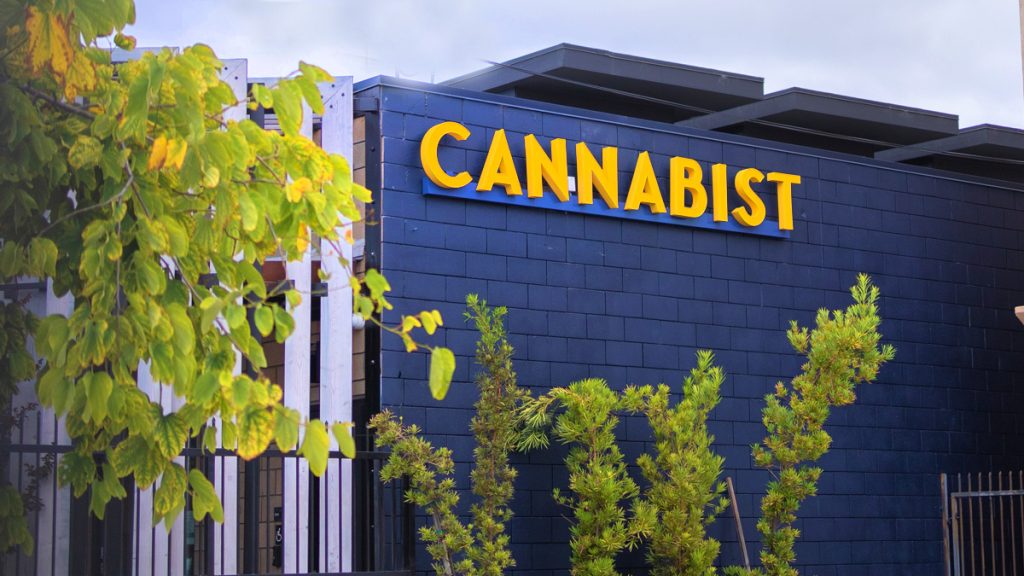Does Weed Help With Cancer? Relief & Benefits

This post is part of our Best Dispensary in San Diego series, sponsored by Cannabist.
Disclaimer: The content provided in this article is intended for informational purposes only and not as a substitute for professional medical advice, diagnosis, or treatment. Always speak to your doctor about the risks and benefits of any treatment. We wish you the best on your road to healing.

There’s no other way to put it, so we will just be blunt; cancer is an all-consuming disease, and one of the most painful and draining experiences to ever endure. Whether you or someone you love has been diagnosed with cancer, it’s likely you’ve spent long, hard hours googling alternatives to chemo and poured tons of time and energy into finding the right care for you or your loved one. Perhaps you’ve stumbled across dozens of treatment options at astronomically high costs, and nothing seems to be the no-brainer choice for treatment.
If you feel like you’re a dead end, don’t fret–not all hope is lost. Medical marijuana is a profound treatment option that can potentially help cancer patients find relief from dozens of unpleasant symptoms commonly associated with cancer and cancer therapies. If you are tired of popping prescription pills that seem to only make matters worse, or desperately want to feel better physically and mentally, we are big proponents for considering weed as a supplemental cancer treatment, and we strongly recommend you give it a shot (with the blessing of your trusted doctor).
Table of Contents
Does Weed Help With Cancer?
Is it really true? Does weed help with cancer, or is that baloney?
Weed might not be the cure-all for cancer, however it is thought to help treat a plethora of symptoms associated with cancer, providing relief and hope for those battling the nasty, life-threatening disease. Let’s dissect how weed interacts with the brain and body to better understand how it can help with cancer relief.
If you have cancer, it’s a safe bet to say you’ve experienced short-term or long-lasting pain throughout your journey. THC–a component of marijuana–is thought to interact with the body’s natural cannabinoid receptors to minimize pain signaling and perception of pain. With the help of THC, cancer patients may begin to reduce systemic inflammation–a cause of chronic pain. Cannabis is thought to be effective in treating pain caused by nerve damage such as peripheral neuropathy, which cancer patients often experience from chemotherapy drugs. Feelings of pain may begin to dissipate after inhaling or ingesting cannabis, though topicals and creams might also help eliminate pain.
Another challenging side effect of cancer treatment and chemotherapy is appetite loss and weight loss. Many cancer patients lose weight as a result, which can also lead to malnutrition, low energy, and other complications. Cannabis contains THC, which works to stimulate the appetite by not only convincing your brain that you’re hungry, even if you have just eaten, but quite literally making food appear to taste more delicious.
Alongside appetite loss as a result of medications to help with cancer treatments such as chemotherapy, cancer patients can experience intense waves of nausea and vomiting. There are synthetic drugs on the market–such as Drabinol–that contain man-made THC and mimic cannabis. Much like cannabis, these synthetic drugs bind to cannabinoid receptors in nerve cells. These drugs were designed to help alleviate nausea and vomiting and stimulate appetite, but nothing compares to the real deal. Cannabis theoretically would offer lower risks than a synthetic alternative.
Other symptoms associated with cancer include–but are not limited to–anxiety, depression, and mood changes. Cancer inflicts a seemingly perpetual rollercoaster of emotions onto its patients, and many cancer sufferers have difficulty coping with their new reality and the constant changes and challenges they have to face in order to win the battle with cancer. Specific cannabis strains may serve as natural mood enhancers, as well as provide calming effects that help decrease anxiety and reduce stress levels–which may be spiked for various reasons. Cancer sufferers and survivors who have noticed a lack of interest in activities and daily life, or feel sadness due to their condition and the hardships it has caused, might find some solace with cannabis.
The Potential Benefits of Cannabis For Cancer Patients
Marijuana for cancer pain management is potentially a potent way to quell everything from nausea and vomiting to persistent pain, in addition to operating as an appetite stimulator. For those experiencing any type of pain–external or internal–marijuana may provide alleviation. Associated anxiety and depression may be eased with the help of marijuana.
These symptoms are extremely difficult to endure on a day-to-day basis, making it impossible to get much done or think clearly. Cannabis may provide temporary relief with less adverse side effects than prescribed medications, and may also make cancer treatments such as chemotherapy more bearable. There is also evidence that cannabinoids may possess anti-tumor effects in several cancer types.

How to Manage Cancer Symptoms with Cannabis
Throughout their battle with cancer, cancer patients endure a whole range of distressing symptoms, and managing these symptoms can be beyond overwhelming if not given the right tools and information. Fortunately, there may be hope to combat such symptoms, and it is possible to make it through such a life-altering experience.
So, how does one attempt to manage cancer symptoms with cannabis? Depending on what symptom you are experiencing, you may be able to utilize cannabis to alleviate it. If you are feeling nausea as a side effect of chemotherapy or medications given to help treat cancer, you’ll want to look into strains believed to have anti-nausea properties. If you’re experiencing chronic pain from nerve damage due to chemo, you’ll want to explore strains thought to have anti-inflammatory properties and a high CBD ratio.
You can inhale cannabis (thought to be best for fast-acting relief although not without its own drawbacks), use THC extracts, apply oils, or consume gummies, edibles, or beverages with THC and CBD. Before deciding on which direction to go, consult with a medical professional and an experienced budtender who can provide specialized advice on the best strains for your needs, as well as your recommended dosage.
What Is an Ideal Dose for Cannabis Products to Help With Cancer?
So what is the ideal THC dosage for cancer patients? Unfortunately, we can’t answer that, because just as everyone’s genetic makeup is different, every individual requires different treatment and different doses. If you are treating cancer with CBD to target chronic pain and inflammation, you might want a pretty high dose–especially since it doesn’t contain psychoactive properties. However, if you are treating cancer with higher amounts of THC, and targeting things like nausea and appetite loss, the ideal dosage for you might be way different.
What works for some won’t work for all, and now that we’ve tackled the question “does weed help with cancer,” we are passing the baton onto you to seek answers from medical professionals who can better assist with dosage recommendations for cannabis products.
Best Strains for Cancer
We already know the answer to “Does weed help with cancer?” Now the question becomes, which strain is best for cancer? What’s more effective–indica or sativa for chemotherapy?
Frankly, there are so many factors that determine what strain is right for you that we’ll spare you advice on what products to purchase and instead inform you of specific terpenes known to help treat cancer symptoms.
For example, monoterpenes have been shown to heal rodent cancers and there is also a theory that they could be helpful in preventing certain human cancers, such as liver and lung cancer. Phytol–a terpene found in green tea–is not just an antioxidant but also an anti-inflammatory, and pain-reliever; it is also thought to be a treatment of liver cancer and breast cancer cells. Strains high in phytol include Sour Diesel.
Terpenes valencene and borneol, rich in citrus, are believed to contain anti-inflammatory and anti-allergic characteristics. Some studies show there is also possible utility in treating cancer.
D-Limonene is another terpene in citrus fruits, giving it that zesty aroma and flavor. Research supports that it may target certain types of cancer and might help reduce breast tumor cell expressions in women. It is also believed to be effective in treating nausea.
Myrcene–which has a peppery scent–is another terpene believed to facilitate relief from nausea due to its aromatic properties. Strains that are thought to be excellent for quelling nausea include: Blueberry Diesel, Granddaddy Purp, Blue Dream, OG Kush, and Durban Poison. CBD content is also thought to promote nausea alleviation due to how it interacts with dopamine receptors.
Is Sativa or Indica Better for Cancer?
Sativa and indica serve different purposes, and the terpenes within specific strains may target specific symptoms one may experience when battling cancer.
But which strain is better for cancer and chemotherapy?
Considering that sativa strains tend to be superior uplifters, if low energy is a symptom then you’ll want to check out sativa strains. If nausea and vomiting are your main symptoms, indica is a strain thought to be reliable at overcoming nauseousness as well as keeping food down. CBD-dominant cannabis products may have a superior impact on pain relief, neuropathy, depression, and anxiety. As always, chat with a budtender who can provide you with more personalized suggestions.
How to Purchase Marijuana
If you’re tired of the same old medications or feeling like you’re at a dead end with treatment options or symptom relief, hitting your local weed shop might do wonders for your mood and your physical and mental wellbeing. Cannabist in San Diego is a top-of-the-line weed dispensary that features THC and CBD infused products ranging from topicals and tinctures to edibles and fresh flower and prerolls. We recommend you connect with one of their incredible employees to discuss what symptoms you are experiencing and what relief you are hoping to have. From there, they will guide you to top of the line products for your particular needs. It makes shopping for medicine actually enjoyable, and you’ll be amazed at how powerful and effective weed can be to help you on your journey in treating and beating cancer.

Key Takeaways On Weed And Cancer
Does weed help with cancer? Research is showing that it may! Here’s how:
- Cancer is an emotionally, mentally, and physically taxing disease, and symptoms associated with cancer may be able to be treated with cannabis
- Cannabis is thought to help increase appetite in patients who have experienced appetite loss as a side effect of cancer treatment
- Cannabis may help alleviate chronic and neuropathic pain in cancer patients
- Terpenes that possess a peppery or citrus scent may be great for nausea relief
- Specific strains with myrcene and limonene terpenes may help tackle nausea those battling cancer experience as a result of chemotherapy
- CBD-dominant cannabis products are thought to have a superior impact on pain relief, neuropathy, depression, and anxiety
- Products that are higher in THC are thought to have more of an effect on nausea and appetite
- Recommended dosages and strains for cancer patients are dependent on the individual
Conclusion
Cancer is beyond unpleasant to experience–it can rob you of your joy and life. If you want to try a holistic and effective approach that can help get you through even the toughest of times, cannabis may be an option. While the potential benefits of cannabis use for cancer patients are still being discovered, it is evident that weed may be able to help cancer patients find some relief and comfort as they battle such an awful disease.
If you are hoping to elevate your mood, regulate your stress levels, reduce anxiety and feelings of depression, and alleviate nausea and pain associated with cancer treatment, it’s worth consulting with your doctor to figure out which cannabis strains might help you find relief!
Media credits: Images of weed for cancer concepts in this article are copyright of LaJolla.com.

















